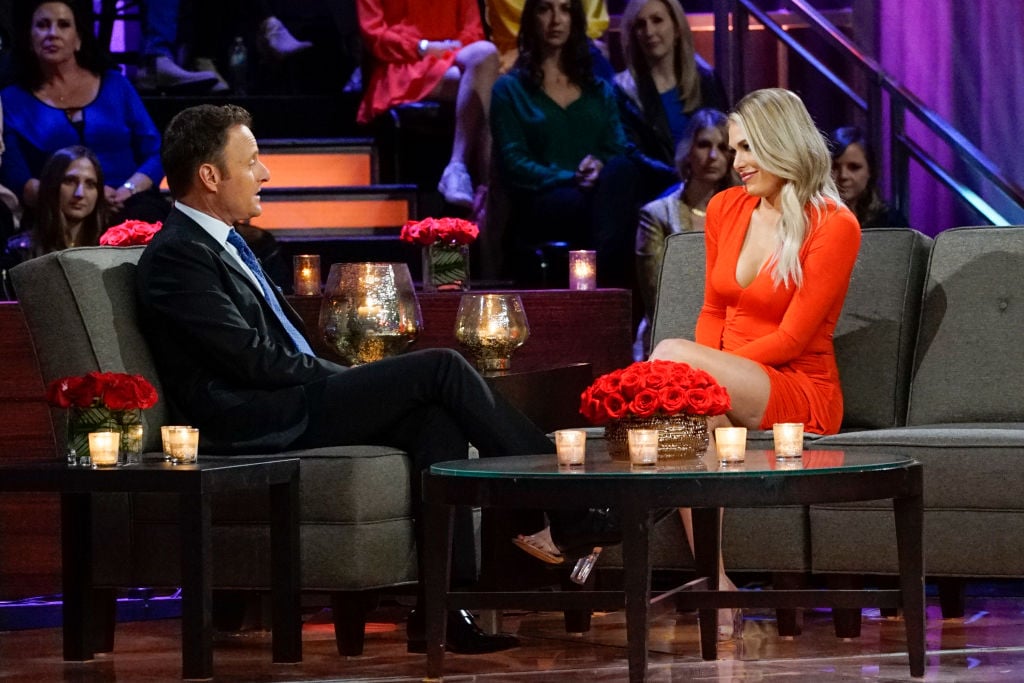‘The Bachelor’: Why Diversity Is Still An Issue In the Franchise
After a long season of The Bachelor, Peter Weber’s journey to find love is almost finished. Season 24 has been a whirlwind of ups and downs with an ending, we’re promised, we won’t see coming.
To prepare viewers for the finale, the Women Tell All special aired, serving up a little extra which included a segment about the online harassment contestants of color have experienced. However, was it enough to save the franchise from its lack of diversity?
‘Women Tell All’ aired a segment about online bullying and harassment to mixed reactions

Generally speaking, the Women Tells All special is full of head-on drama where emotions from the seasons’ entirety come to a head. While this particular special wasn’t all that different than previous specials, producers added a segment near the end to address online bullying and harassment some of the women have received.
Former bachelorette, Rachel Lindsey, joined host, Chris Harrison, to read some of the graphic messages which included racial slurs. Some of the women broke down in tears, others silently supported.
The show clearly had great intent — to put the focus onto what is happening behind the scenes — but it was met with mixed reactions. Some pointed out the irony considering a few of the women felt bullied on the set. Others applauded the franchise’s choice to highlight an important issue that’s affecting so many of its participants.
Whichever side you land, one segment on one special won’t fix everything, may say. Just as a lack of diversity remains to be an issue (and targeted harassment to diverse contestants), the efforts of the franchise aren’t enough for many who’ve been apart of it.
Here’s why diversity continues to be an issue, according to Rachel Lindsey
Lindsey, the first and only black Bachelorette, drove the message of the special home. Her presence was an important one, representing the franchise’s efforts to widen their diversity pool.
Women of color have sporadically appeared on The Bachelor as contestants such as season 6 winner, Mary Delgado, Tessa Horst in 2007, and Catherine Giudici in 2013.
“[Producers] bring the lead — I hate to say this — options that [he or she] are attracted to,” Giudici told Entertainment Tonight last December. “Sean Lowe has dated all different types of races before, so I think that’s why it works really well in our season, that he chose somebody that wasn’t white.”
She continued: “The Bachelor has a very diverse audience. So, being able to be seen and showcase a variety of different types of people, I think is really smart. She noted that in the end, the contestant pool comes down to the lead’s preferences and attraction.
2013 also marks the first non-white bachelor, Juan Pablo Galavis with Lindsey four years later. Hers is said to have been the most diverse cast yet.
“Originally I felt a lot of pressure, because who doesn’t have pressure being the first at anything?” Lindsay told ET after she was chosen. “But at the same time… I’m so humbled and honored to be the one chosen to take on this role and this experience.”
That said, Lindsey’s also been a critic of the franchise’s choices.
“How many Peters have we seen before? What season are we on? 24. So, we’ve seen 24 Peters. I’m bored,” she told ET last September. “For the first time, I was very confident that we were going to see our first black Bachelor. And so if no one else is going to speak on it, then I guess it’s my duty to say it.”
Why Clare Crawley as ‘Bachelorette’ isn’t enough to change the status quo
Longtime Bachelor executive producer Martin Hilton recently told ET that inclusivity and diversity are at the forefront of their minds but they want it to happen “in an organic way.”
“We do what we can to bring people in from all [types of backgrounds] — particularly looking for people of color, for sure,” he said. “We’re trying to figure out how to do that better.”
He noted that there’ no “quota” for how many diverse contestants to include.”We’re just looking — and it’s getting harder and harder, by the way — to find people who are really authentically there [to find love].”
Now that the announcement of the next bachelorette, Clare Crawley, is out there, conversations have split from only race to age. She’s the oldest lead to be cast showing the franchise may be listening, however little it seems.
Lindsey still says there’s work to be done.
“It’s more of, ‘Let’s talk about something that people are afraid to talk about and that maybe makes you uncomfortable,'” she said. “But we’re uncomfortable every day because we live it and we’re attacked with it every day, every week, every month. And I think that’s what’s so beautiful — that we’re not pretending it’s not an issue. We’re addressing it head-on.”
The Bachelor concludes next Monday and Tuesday at 8 p.m. ET on ABC.


